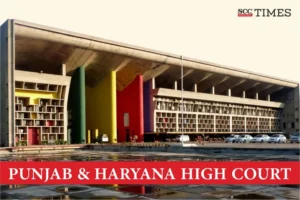Punjab and Haryana High Court: In a petition filed essentially complaining of noise pollution caused by Respondent 7, the Division Bench of Sheel Nagu, CJ and Anil Kshetarpal, J., stated that since noise pollution was part of the air pollution and was punishable under the Air (Prevention and Control of Pollution) Act, 1981 (‘Air Act’), the petitioner was granted liberty to approach the police station concerned and lodge an FIR in case of any violation of the guidelines laid down in Reet Mohinder Singh v. State of Punjab, 2019 SCC OnLine P&H 7001 (‘Reet case’).
The Court stated that this direction did not absolve the District Magistrate and the Senior Superintendent of Police, since they have been held to be personally liable, as per the directions passed by a co-ordinate Bench of this Court on 22-07-2019 in Reet case (supra). The Court directed the District Magistrate and Senior Superintendent of Police to be vigilant and in case any violation was pointed out by any citizen of the States of Punjab, Haryana and UT Chandigarh, appropriate steps should be taken in accordance with law, as expeditiously as possible.
Background
In the present case, during the pendency of this petition, the Haryana State Pollution Control Board (‘the Board’) and State of Haryana have filed their respective affidavits stating that Respondent 7 was summoned by the authorities. Subsequently on appearing, Respondent 7 assured of maintaining the noise levels, which were prescribed by guidelines laid down in order passed by a Co-ordinate Bench of this Court on 22-07-2019 in Reet case (supra).
Analysis, Law, and Decision
The Court noted that the affidavits filed by the Board and States revealed that 49 complaints were received from 2021 till May 2024, out of which 25 complaints were disposed of and 24 were pending consideration. The Court stated that even though the reply filed by the Board was silent about the status of the complaints that were disposed of, but it appeared that the grievance of noise pollution was a continuous one and would have to be monitored from micro to macro level by the authorities concerned. These authorities included the executive authorities under the State of Haryana including the District Magistrate and Superintendent of Police, who have been held to personally liable in case of any violation of the said guidelines laid down in Reet case (supra).
The Court stated that since noise pollution was part of the air pollution and was punishable under the Air Act, the petitioner was granted liberty to approach the police station concerned and lodge an FIR in case of any violation of the guidelines laid down in Reet case (supra). Further, the offence of noise pollution was a cognizable one under the Air Act, therefore, if any such cognizable offence was informed to the police authorities, they were duty bound to register an FIR under Section 1541 Criminal Procedure Code, 1973 (‘CrPC’). However, if the police failed to perform its duty under Section 154 of CrPC, then the aggrieved person was free to approach the Magistrate under Section 156(3)2 CrPC.
However, the Court stated that this direction did not absolve the District Magistrate and the Senior Superintendent of Police, since they have been held to be personally liable, as per the directions passed by a co-ordinate Bench of this Court on 22-07-2019 in Reet case (supra). The Court directed the District Magistrate and Senior Superintendent of Police to be vigilant and in case any violation was pointed out by any citizen of the States of Punjab, Haryana and UT Chandigarh, appropriate steps should be taken in accordance with law, as expeditiously as possible.
The Court further stated that the time frame laid down in Lalita Kumari v. State of UP, (2014) 2 SCC 1, should be adhered to while registering any offence and accordingly, disposed of the present petition.
[Abhilaksh Sachdev v. State of Haryana, 2024 SCC OnLine P&H 13874, decided on 04-11-2024]
Advocates who appeared in this case:
For the Petitioners: Abhinav Sood, Advocate; Nitesh Jhajhria, Advocate; Mehndi Singhal, Advocate; Rohit Mittal, Advocate; Nitin Chaudhary Advocate; Saurav Bhatia, Advocate; Kuljinder Singh Billing, Advocate and Sylvester Stephen, Advocate.
For the Respondents: Deepak Balyan, Addl. A.G., Haryana; Salil Sabhlok, Sr. DAG, Punjab; Harpriya Khaneka, Advocate; M.S. Virk, Advocate; Mikhail Kad, Advocate for Ashdeep singh, Advocate; J.S. Wasu, Advocate; Himanshu Arora, Advocate.
1. Section 173 of Nagarik Suraksha Sanhita, 2023 (‘BNSS’)

